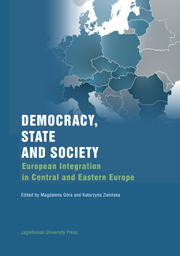Book contents
- Frontmatter
- Contents
- List of contributors
- Europeanisation in the EU New Member States. Aspects and Research Agendas
- Part one Democracy after Enlargement
- Part two Identity Transformations
- Part three Civil Society Organisations in Central and Eastern Europe
- Part four Europeanisation of International Relations
- The Changing Nature of Foreign Policy and International Relations in Central and Eastern Europe
- From Existential Politics Towards Normal Politics? The Baltic States in the Enlarged Europe
- Poland's Power and Influence in the European Union: The Case of Its Eastern Policy
- Visegrad Group Cooperation and “Europeanisation” of New EU Member States
- Index
From Existential Politics Towards Normal Politics? The Baltic States in the Enlarged Europe
from Part four - Europeanisation of International Relations
Published online by Cambridge University Press: 05 September 2014
- Frontmatter
- Contents
- List of contributors
- Europeanisation in the EU New Member States. Aspects and Research Agendas
- Part one Democracy after Enlargement
- Part two Identity Transformations
- Part three Civil Society Organisations in Central and Eastern Europe
- Part four Europeanisation of International Relations
- The Changing Nature of Foreign Policy and International Relations in Central and Eastern Europe
- From Existential Politics Towards Normal Politics? The Baltic States in the Enlarged Europe
- Poland's Power and Influence in the European Union: The Case of Its Eastern Policy
- Visegrad Group Cooperation and “Europeanisation” of New EU Member States
- Index
Summary
Abstract: This article presents a critical discourse analysis of the Baltic states' self-positioning within European foreign policy. It argues that, despite certain relief in their immediate security concerns after the dual enlargement of the EU and NATO, the shift from existential politics to normal politics by the Baltic states is far from being accomplished. The way in which the countries of Central and Eastern Europe (CEE) have responded to the construction of their identity as “Europe but not Europe” throughout the enlargement processes of the EU and NATO has been largely neglected in empirical studies on their post-Cold War self-conceptualisations in the European arena. Yet, the experience of being framed as simultaneously in Europe and not quite European has left a constitutive imprint on the current security imaginary of the Baltic states. William Connolly's concept of the politics of becoming is thus applied to analyse the Baltic version of becoming a subject in the field of common European foreign policy.
Introduction
The analytical premise of this article is a Sartrean dictum: “We are what we make of what others have made of us”. Since its inception in the age of Enlightenment, the notion of Eastern Europe has been the embodiment of liminality, of the state “betwixt and between” (see Turner 1969) in Europe's self-image.
- Type
- Chapter
- Information
- Democracy, State and SocietyEuropean Integration in Central and Eastern Europe, pp. 249 - 270Publisher: Jagiellonian University PressPrint publication year: 2011



